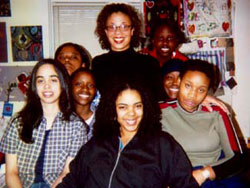Makeeba McCreary: Making a Commitment to Young Girls of Color through Girlsworld
Makeeba McCreary is a doctoral student TC in Educational Administration. She is also the Director of GirlsWorld, a non-profit organization that helps young women of color in urban Boston to "envision and successfully pursue choices that lead to productive, positive adulthood."
You may ask why does she subject herself to such a strenuous commuting lifestyle ?
McCreary, who has an Ed.M from the Harvard School of Education, has worked with "at risk" adolescent populations in a variety of settings. She flies from Boston to New York to take classes and piles on independent research from Professors Craig Richards and Linda Powell, because, as she said in a recent interview, "I am concerned about girls of color in terms of positively impacting their lives but also from an organizational perspective. How does one decision on a policy level impact this population two or three years down the line? How can we make sure that the decisions we are making at that level will really play themselves out to be positive in the future?"
GirlsWorld began in November of 1999 when three non-profit agencies, The Boston Institute for Arts Therapy (BIAT), whose mission is to use the arts draw out the best in people, the Dimock Community Health Center, a community based organization that provides an array of health and human services, and The Boston Coalition of Black Women Inc., a volunteer organization whose mission is to provide leadership and resources to empower African American girls, collaborated to create "a world where girls are given an opportunity to investigate their creative possibilities to change the world."
When McCreary was approached by the three organizations to take on the responsibility of running the new organization, she was up for the challenge. "I was excited to work with the three agencies because they each cover different areas of my interest and it was an exhilarating opportunity to work with them collectively," said McCreary.
GirlsWorld serves approximately 30 young women a week. The program numbers are small because of the need for wide-ranging support in a start-up operation and because GirlsWorld has learned that it cannot do everything well but rather it needed to concentrate on what it could do best. While McCreary and others had first thought the program would attract a diverse population they found that the program's primary applicant pool would most likely come from a fairly homogeneous group---African American, Latina and Caribbean girls from surrounding neighborhoods. The age group ranges from 10-18 with older girls serving as mentors for the younger ones.
"My girls don't come with a lot of parental involvement. They don't come with a history of having been involved in extracurricular activities and, certainly, academically they are not necessarily the highest achievers. With all of that, there is also the component of a emotional health and that's been a big one because we really do have some applicants that we can't serve. If we had more faculty, more clinically trained staff on board, that would be possible. I always impress upon our funders that that we can't open up to 50 more girls and run this huge program without more support. It would be chaotic," McCreary said.
The after school program includes four major components: Expressive Arts Groups, Academic Support, Mentoring, and Community Service.
Several arts and drama therapists/ educators from The Boston Institute for Arts Therapy use the arts as a way to investigate psychosocial aspects of the self as a creative way to address interpersonal issues. "In working on self-portraits the girls inadvertently explore challenging life experiences without having to express their 'tragedies' verbally," said McCreary.
McCreary was candid about how much weight she gives to this aspect of the program. "Given the issues facing this population I think that the arts component is the one that probably speaks to me the most. I don't see it as a time for group therapy. I think I see it more as a time of refuge, a safe space where the girls come, work on a self-portrait. There is no need for them to talk about the tragedies that they have experienced."
The Academic Support program is run by peer leaders through one on one tutoring and homework help. Mentoring is carried out by "Sister to Sisters," sponsored by the Boston Coalition of Black Women Inc., which offers nurturing and mentoring relationships and the opportunity to learn from positive role models. The Community service component, "Raising Readers," is a favorite of the girls, who are paired with pre-school children of the Dimock Community Health Center's Early Headstart program.
McCreary summed up her work at GirlsWorld by saying, "I think the beauty of this program is that it gives a venue for self-expression that the girls may never, otherwise, be exposed to."
Although McCreary is torn about continuing her work at GirlsWorld while working on her doctorate, she has finally made up her mind to return to TC full-time. "It's been a difficult decision but I feel that in the long-run I'll be able to do more with my doctorate. I'm leaving with a lot of emotion," said McCreary.
Published Tuesday, Sep. 18, 2001
